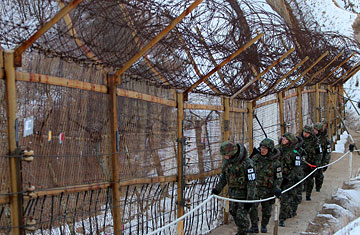
South Korean soldiers check on the front line of the demilitarized zone (DMZ) that separates the two Koreas on Dec. 24, 2010
If Private Jeon is celebrating inside, his disciplined military exterior doesn't show it. Dressed in khaki with black, wide-rimmed spectacles, the 22-year-old is due to finish his 21 months of military service next month, an obligation for almost all of South Korea's 25 million men. "It's good experience for my job," Jeon says during an educational tour of the Demilitarized Zone, the barb-wired no-man's land that has divided the Korean peninsula for 58 years and counting. "Frankly," he adds, "I don't like the military culture. But there's a lot of economic uncertainty."
A national duty and, in theory, an equalizer in a nation with a growing income gap, South Korea's mandatory military service has become an issue of much debate following last year's sinking of the Cheonan Navy vessel and shelling by the North that killed four people on Yeonpyeong Island close to the maritime border. In response, hawks called on the government to increase the period of service from 21 to 24 months, while other segments of society said Seoul should continue a long-standing policy under which compulsory military service is scheduled to be reduced. At 687,000 strong, South Korea's military is the sixth-largest in the world, requiring all healthy men to serve between the ages of 19 and 36.
So far, President Lee Myung-bak has not increased or reduced service. Instead, in December, he froze the current term at 21 months while his government grappled with why last year's attacks happened and what the government and military should do about it. Seoul's military spending has risen nearly 6% this year to $27.7 billion and the government has passed a host of military reforms. But in the end, Seoul did nothing to retaliate — a decision that did not go down well with the average South Korean. A poll by daily newspaper Chosun Ilbo at the end of last year found a majority of people feel the government's response was inadequate.
Disputes over the nation's mandatory military service — a policy that has been in place for the full 63 years of the country's existence — have been brewing for years. Civic and human rights' groups, students, the political opposition, women's organizations, men who have been deemed healthy enough to serve and critics of some privileged few who have not have all asked who should serve, the extent to which objectors should be tolerated and whether those that do their time deserve bonuses upon re-entering the job market. The policy of compensating soldiers returning to work, abolished in 1999 on sexual equality grounds, is now gaining popularity again: A Gallup Korea poll at the end of May found nearly 80% of South Koreans are in favor of reinstating the payment.
Meanwhile, dodging the draft has become something of an art. Conscientious objectors and the rich and famous have gone to extraordinary lengths to escape the draft, an act which carries a minimum 18 months in prison. Some have opted for last-minute full-body tattoos that disqualify them for service; others have lost extreme amounts of weight to fail the medical exam, faked personal records or even changed their nationality. At present, 850 South Koreans are in jail for dodging the draft, including many Jehovah's Witnesses who say it is contrary to the 'love thy neighbor' doctrine, according to Amnesty International.
A number of celebrities and family members of the rich and powerful have in the past tried to elude military service by the use of doctored medical records and even bribes, among other means. South Korea's biggest pop sensation Rain is due to serve in September, and it's not yet clear whether he'll swap his trademark sunglasses and snappy suits for combat boots and khakis. His entourage recently started to bar journalists' questions on the issue.
The backdrop to these shenanigans, however, is more serious. South Korea has in the past year has conducted a greater number of military exercises with the U.S. in and around the DMZ, leading to a series of verbal threats by the North. Popular support for military action against its northern neighbor has risen dramatically in recent months. After the sinking of the Cheonan in March 2010, less than 30% of South Koreans backed a military response. That figure rose significantly after the shelling of Yeonpyeong Island to nearly 70%, according to a December poll by Chosun Ilbo.
At Hongik University in Seoul, the verdict on military service is almost unanimous among male students. "I hated it," says 25-year old math major Lee Sung-hwan. But despite the usual complaints that all cadets have to wear the same clothes and short hair cuts and can't see their girlfriends, Lee believes military service in South Korea is more necessary than ever. Why? "Because of North Korea," he says.
Not surprisingly, it's at the DMZ — both a macabre tourist destination and a very real frontline — where the thousands of young men who comprise South Korea's military might are most visibly on display. The DMZ serves as a temporary home to servicemen enlisted as glorified tour guides in and around sites that attract about five million tourists per year. These draftees are the face of the South Korean military to the world and the enemy — and are, unsurprisingly, tall and easy on the eye. "Is he handsome?" asks a Chinese tour guide in Mandarin as a young, gangly soldier walks onto a tour bus to check passports and ID cards before crossing into the DMZ. A handful of (mostly female) tourists on the bus have a look. "Handsome," they reply.
